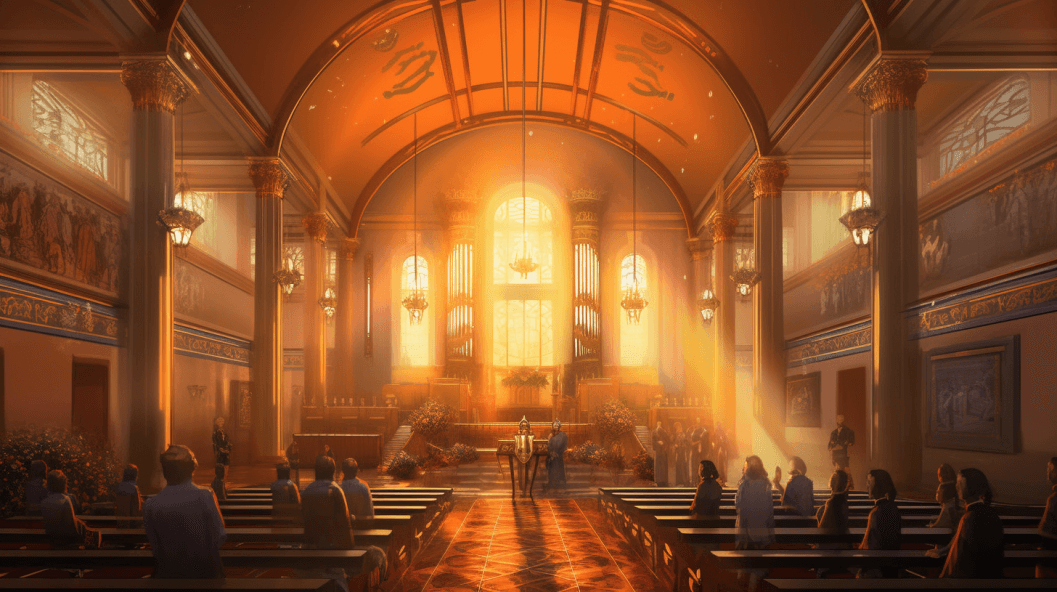Freemasonry is one of the world’s oldest and most respected fraternal organizations, with a history that dates back to the early 17th century or even earlier. Throughout the centuries, the organization has been shrouded in mystery, intrigue, and fascination, as its members have been known to hold prominent positions in society, politics, and the arts.
While the allure of freemasonry is undeniable, many people are unaware of the process and requirements involved in joining this esteemed brotherhood. The purpose of this blog post is to provide a comprehensive guide to becoming a Freemason, from understanding the fundamental principles and structure of the organization to the steps involved in joining a local Lodge.
By the end of this article, you will have a clear understanding of the journey that awaits you in the world of Freemasonry and the enriching experiences it has to offer.
Understanding Freemasonry
Before embarking on the journey to become a Freemason, it’s essential to gain a fundamental understanding of the organization, its core values, and its structure. This knowledge will not only help you decide if Freemasonry is the right path for you but also enable you to appreciate the significance of the fraternity you aim to join.
Freemasonry values and principles
Freemasonry is built upon three core values, often referred to as the “three principal tenets” of the organization. These values guide Freemasons in their personal lives and interactions with others.
- Brotherly love: This principle emphasizes the importance of treating all people with kindness, respect, and understanding. Freemasons strive to develop strong bonds of friendship and support within the fraternity, transcending social, political, and religious differences.
- Relief: Freemasons are dedicated to helping those in need, both within their community and beyond. The principle of relief encourages members to practice charity, provide aid, and offer assistance to those less fortunate.
- Truth: The pursuit of truth is at the heart of Freemasonry. Members seek knowledge, wisdom, and self-improvement to better themselves and their communities. Integrity, honesty, and ethical behavior are essential aspects of living a life guided by truth.
Structure of Freemasonry
The organization of Freemasonry is hierarchical, with local, regional, and international elements.
- Local Lodges: The foundation of Freemasonry is the local Lodge. These Lodges serve as the primary meeting place for members, where they participate in rituals, ceremonies, and social events. Each Lodge operates independently, but they all follow a similar structure and adhere to the same basic principles.
- Regional Grand Lodges: Local Lodges are organized under the jurisdiction of a Grand Lodge, which typically governs a specific geographic region. Grand Lodges oversee the administration of the Lodges within their jurisdiction and ensure that they adhere to the rules and regulations of Freemasonry.
- Worldwide organization: While there is no single, centralized governing body for Freemasonry globally, various international organizations and conferences help to maintain connections and cooperation among Grand Lodges and their members.
Degrees in Freemasonry
Freemasonry is organized into a series of progressive degrees, each with its own rituals, teachings, and responsibilities.
- Entered Apprentice: The first degree of Freemasonry, Entered Apprentices begin their journey by learning the basics of the organization, its symbolism, and its moral lessons.
- Fellowcraft: The second degree, Fellowcrafts delve deeper into the teachings of Freemasonry, exploring the importance of knowledge and the liberal arts and sciences.
- Master Mason: The third and final degree, Master Masons have completed their initial Masonic education and are now considered full members of the fraternity. As Master Masons, they are eligible to participate in all aspects of Lodge life and can further explore additional degrees and appendant bodies within Freemasonry.
Requirements to Become a Freemason
Freemasonry is an organization that welcomes individuals from all walks of life, but there are certain requirements that must be met to ensure that prospective members are a good fit for the fraternity. Before embarking on the path to becoming a Freemason, it’s crucial to understand and evaluate if you meet these requirements.
Age requirement
The minimum age to join Freemasonry varies depending on the jurisdiction. In most cases, the required age is 18 or 21 years. It’s important to check with your local Lodge or Grand Lodge to determine the specific age requirement in your area.
Belief in a Supreme Being
One of the fundamental tenets of Freemasonry is the belief in a Supreme Being. Prospective members must acknowledge their faith in a higher power, regardless of their specific religious beliefs or affiliations. Freemasonry encourages religious tolerance and does not advocate for any particular religion or denomination.
Good moral character
Freemasons are expected to uphold the highest ethical standards in both their personal and professional lives. Candidates for membership must demonstrate a history of good moral character and be able to provide references to attest to their reputation. Additionally, most jurisdictions require that applicants have no felony convictions or other serious criminal offenses on their record.
Commitment to personal growth and community service
Prospective members should have a genuine interest in personal growth, self-improvement, and contributing to their communities. Freemasonry is an organization that values lifelong learning and encourages its members to pursue knowledge and wisdom.
It also emphasizes the importance of community service and philanthropy, with many Lodges actively participating in charitable activities and initiatives. Candidates should be prepared to commit to these principles and engage in the continuous pursuit of personal and societal betterment.
Steps to Become a Freemason
Once you’ve determined that you meet the requirements to join Freemasonry, the next step is to follow the process of becoming a member. Here is an overview of the steps you will need to take to become a Freemason:
Research and learn about the organization
Before taking any formal steps toward membership, it’s essential to conduct thorough research on Freemasonry. Read books, explore reputable online resources, and talk to current Freemasons to gain a deeper understanding of the organization, its values, and its traditions. This knowledge will help you make an informed decision about whether Freemasonry is the right fit for you.
Find a local Lodge
To join Freemasonry, you must first identify a local Lodge in your area. You can typically find information about local Lodges and their meeting schedules through the website of the Grand Lodge that governs your region. Alternatively, you can consult local directories or ask for recommendations from friends or acquaintances who are already members.
Attend social events and open meetings
 Many Lodges host social events or open meetings that are accessible to non-members. Attending these events provides an opportunity to meet current Freemasons, learn more about the organization, and get a sense of the Lodge’s atmosphere and culture. Use these events as a chance to ask questions and build connections with potential sponsors.
Many Lodges host social events or open meetings that are accessible to non-members. Attending these events provides an opportunity to meet current Freemasons, learn more about the organization, and get a sense of the Lodge’s atmosphere and culture. Use these events as a chance to ask questions and build connections with potential sponsors.
Request an application
- Petitioning for membership: To formally apply for membership, you will need to submit a petition or application to the Lodge you wish to join. These forms typically require personal information, details about your background, and an explanation of your interest in joining Freemasonry.
- Sponsorship from current Freemasons: Most Lodges require that your application be endorsed by one or more current Freemasons who can vouch for your character and suitability for membership. This is why building connections with members during social events or open meetings is crucial.
The investigation and interview process
After submitting your application, the Lodge will assign a committee to investigate your background and interview you. The purpose of this process is to ensure that you meet the requirements for membership and that you are committed to upholding the values and principles of Freemasonry.
Balloting and acceptance
Once the investigation and interview process is complete, the Lodge will hold a vote among its members to determine whether to accept you as a new member. If the vote is favorable, you will be notified of your acceptance and provided with details about the initiation ceremony.
The initiation ceremony
The final step in becoming a Freemason is the initiation ceremony, during which you will be admitted into the organization as an Entered Apprentice. This ceremony is a solemn and symbolic event, marking the beginning of your journey as a Freemason. After your initiation, you can progress through the subsequent degrees and fully immerse yourself in the fraternity’s teachings and traditions.
The Freemason Journey
Once you have become a Freemason, your journey of personal growth, learning, and service has just begun. As a member, you will have numerous opportunities to deepen your understanding of Freemasonry, engage with your fellow members, and contribute to your community.
Advancing through the degrees
- Rituals and ceremonies: As you progress through the degrees of Freemasonry, you will participate in rituals and ceremonies designed to impart moral and philosophical lessons. These experiences will help you gain a deeper understanding of the organization’s teachings and symbolism, allowing you to apply these principles to your daily life.
- Mentorship and support: Throughout your Masonic journey, you will have access to mentorship and support from more experienced members who can help guide you in your personal and spiritual growth. This network of guidance and friendship is one of the most valuable aspects of Freemasonry.
Involvement in the Lodge
- Participating in meetings and events: Regular attendance and participation in Lodge meetings and events are crucial for deepening your connections with fellow members and staying engaged with the organization. As a Freemason, you are encouraged to contribute your ideas, talents, and energy to the betterment of the Lodge and its activities.
- Taking on leadership roles: As you become more involved in your Lodge, you may have the opportunity to take on leadership roles and responsibilities. These positions allow you to further develop your skills, serve your fellow members, and contribute to the smooth functioning of the Lodge.
Networking and community involvement
- Philanthropy and charitable activities: Freemasonry places a strong emphasis on community service and charitable work. As a member, you will have the opportunity to participate in various philanthropic initiatives, both within your Lodge and in cooperation with other organizations. These activities allow you to make a positive impact on your community and embody the values of Freemasonry.
- Building connections with fellow Freemasons: One of the most rewarding aspects of being a Freemason is the opportunity to build lasting friendships and connections with fellow members. These relationships often extend beyond the Lodge, providing personal and professional networking opportunities that can enrich your life in countless ways.
By actively engaging in the Freemason journey, you will not only gain valuable knowledge and experiences but also contribute to the growth and betterment of the organization and your community.
The Bottom Line
Embarking on the journey to become a Freemason is a decision that can lead to a lifetime of personal growth, meaningful friendships, and impactful community involvement. By understanding the requirements, following the steps to join, and actively engaging in the Masonic journey, you will have the opportunity to immerse yourself in the rich history, traditions, and values of this esteemed organization.
In this comprehensive guide, we have outlined the process of becoming a Freemason, from understanding its core principles and structure to the necessary steps for joining a local Lodge. As you contemplate taking this path, remember that Freemasonry is not just about personal benefits; it is a commitment to the betterment of yourself, your fellow members, and your community.
If you feel that Freemasonry aligns with your personal beliefs and aspirations, we encourage you to take the first steps toward joining this historic and noble fraternity. Your journey as a Freemason has the potential to be an enriching and transformative experience that will impact your life and the lives of those around you.


